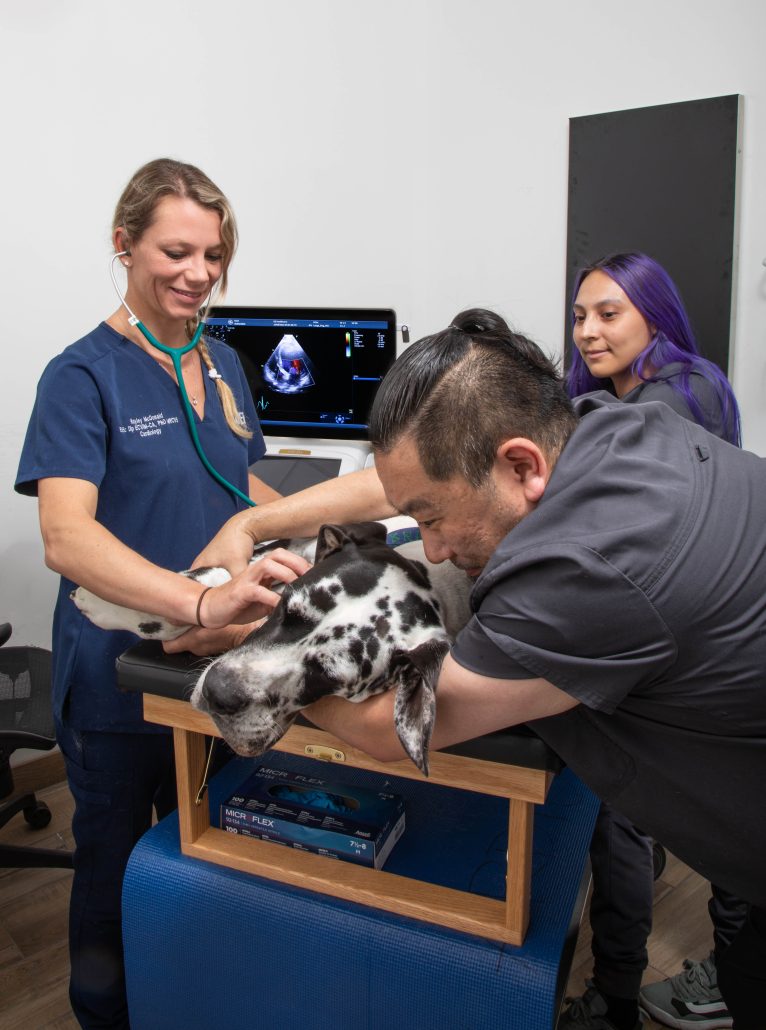Discovering the Vital Providers Used by a Veterinary Cardiologist: Understanding Ultrasound and CT Check Techniques
Vet cardiologists play an essential role in the health of animals by identifying and dealing with various heart disease. They make use of innovative imaging methods, such as cardiac ultrasound and CT scans, to provide exact evaluations. Each approach has its distinctive advantages and applications. Understanding these strategies is crucial for family pet owners looking for the very best care for their companions. What variables should family pet owners take into consideration when selecting between these analysis tools?

The Duty of Vet Cardiologists in Pet Health Care
Vet cardiologists play a vital duty in the healthcare of animals, concentrating specifically on diagnosing and treating heart-related conditions. They possess specialized training that enables them to translate complicated analysis examinations and recognize numerous cardio concerns. These specialists utilize sophisticated strategies, such as echocardiography and electrocardiography, to analyze heart feature and framework accurately.Veterinary cardiologists additionally create customized therapy strategies that might consist of medicines, way of life modifications, and, in many cases, medical treatments. Their proficiency encompasses educating animal owners about heart health, highlighting the relevance of normal exams and early detection of potential troubles. Cooperation with basic veterinarians is vital, as it assures detailed treatment for family pets with thought cardiac concerns. By using specialized services, veterinary cardiologists substantially improve the quality of life for pet dogs and offer comfort for their proprietors, reinforcing the importance of heart wellness in general pet health.
Typical Cardiac Issues in Pet Dogs
Common heart problems in animals can greatly affect their wellness and lifestyle. Heart murmurs, different sorts of cardiomyopathy, and hereditary heart defects are amongst one of the most common problems that veterinarians run into. CT Scans For Animals. Understanding these problems is essential for pet owners to assure prompt diagnosis and appropriate therapy
Heart Murmurs in Pets
Heart whisperings can be a resource of concern for family pet owners, they are not constantly a measure of major wellness issues. A heart whispering is an uncommon sound created by stormy blood flow within the heart. In animals, these whisperings can be triggered by various aspects, consisting of congenital heart problems, shutoff issues, or even anxiety throughout examinations. Numerous animals with heart whisperings lead typical lives without considerable health and wellness influences. To determine the underlying cause, veterinary cardiologists typically utilize analysis strategies such as echocardiograms and Doppler ultrasounds. Early discovery and analysis are essential, as they may assist handle any type of prospective heart problems successfully. Pet dog proprietors are urged to consult their vet for a detailed evaluation if a heart whispering is detected.
Cardiomyopathy Types Explained
Cardiomyopathy incorporates a team of conditions influencing the heart muscular tissue, bring about endangered heart feature in pet dogs. The most common types consist of dilated cardiomyopathy (DCM), hypertrophic cardiomyopathy (HCM), and restrictive cardiomyopathy (RCM) DCM primarily affects pets, triggering the heart to expand and compromise, which lessens its capacity to pump blood successfully. On the other hand, HCM is more widespread in felines, characterized by the enlarging of the heart wall surfaces, typically resulting in blocked blood circulation. RCM, though less usual, takes place when the heart muscle mass ends up being rigid, limiting its ability to load with blood. Each type provides unique obstacles in diagnosis and therapy, requiring specialized veterinary cardiological analysis to guarantee peak administration and take care of influenced family pets.
Congenital Heart Flaws
Congenital heart issues represent a substantial classification of cardiac problems in pets, distinct from obtained problems such as cardiomyopathy - Ultrasound For Dogs. These issues are structural irregularities existing at birth, influencing the heart's regular feature. Common kinds consist of license ductus arteriosus, ventricular septal problems, and pulmonic stenosis. Symptoms might differ widely, ranging from light to serious, and can consist of exercise intolerance, coughing, and trouble breathing. Early medical diagnosis through innovative imaging strategies like ultrasound is necessary for efficient administration. Veterinary cardiologists play an important function in determining these problems and suggesting ideal therapy choices, which may consist of clinical administration or medical treatment. Acknowledging genetic heart flaws permits far better end results and boosted lifestyle for affected family pets
Recognizing Heart Ultrasound: Exactly How It Functions
A significant number of veterinary techniques currently use heart ultrasound as an important analysis tool for examining heart wellness in pets. This non-invasive strategy makes use of high-frequency acoustic waves to produce photos of the heart's framework and function. During the treatment, a veterinary specialist uses a gel to the animal's chest and utilizes a transducer to give off ultrasound waves. These waves bounce off the heart and bordering structures, producing real-time images on a monitor.Veterinarians can examine various elements of cardiac wellness, consisting of chamber dimension, wall surface activity, and shutoff function. Furthermore, cardiac ultrasound allows for the detection of irregularities such as fluid build-up and genetic heart problems. This method is important for identifying problems that may not be visible via typical radiographs. By providing comprehensive info concerning the heart's anatomy and performance, heart ultrasound help in developing efficient therapy plans for animals experiencing heart problem.
The Relevance of CT Checks in Identifying Heart Conditions
How do CT scans improve the medical diagnosis of heart conditions in veterinary medicine? CT scans offer thorough cross-sectional pictures of the heart and surrounding frameworks, enabling vets to visualize complex physiological partnerships. This imaging technique is specifically beneficial in recognizing congenital heart problems, cardiac tumors, and irregularities in blood vessels. By using advanced imaging formulas, CT scans can examine heart chamber dimensions and function, offering a comprehensive sight that might be hard to achieve with standard methods.Additionally, CT angiography can envision blood flow and identify areas of constriction or obstruction, which is essential for planning possible interventions. The speed and precision of CT scans additionally promote quick diagnoses, essential in emergency circumstances. Eventually, the consolidation of CT checks into vet cardiology considerably boosts the precision of medical diagnoses, enabling targeted treatment plans and boosting individual end results for pets dealing with heart conditions.
Contrasting Ultrasound and CT Check Techniques
While both ultrasound and CT scans are vital devices in vet cardiology, they use distinct advantages and constraints that influence their usage in identifying heart disease. Ultrasound, or echocardiography, provides real-time imaging of the heart's structure and function, permitting veterinarians to evaluate heart chambers, shutoffs, and blood circulation. It is especially reliable for reviewing conditions like coronary infarction and cardiomyopathy. However, ultrasound might be limited in visualizing particular anatomical structures due to patient dimension or obesity.In contrast, CT scans deal in-depth cross-sectional photos of the heart and surrounding cells, making them optimal for identifying structural abnormalities, growths, or vascular issues. CT scans offer extensive understandings, they require sedation and may entail radiation direct exposure. Inevitably, the selection in between ultrasound and CT scans depends on the details scientific scenario, the client's condition, and the details required for a precise diagnosis.
Therapy Choices Available Via Vet Cardiology
Vet cardiology uses a range of therapy choices customized to resolve different heart disease in animals. Therapy plans usually begin with way of life alterations, including diet regimen changes and exercise adjustments, focused on boosting overall heart wellness. Medicines play a vital function, with cardiologists suggesting medicines such as diuretics, beta-blockers, and ACE preventions to enhance and manage symptoms check my reference heart function.In much more severe instances, interventional procedures, such as balloon valvuloplasty or stent positioning, may be required to relieve clogs or improve blood flow. For sure genetic heart flaws, surgical choices might be explored to remedy architectural concerns. In addition, recurring tracking and follow-up care are important parts of a thorough treatment plan, allowing for timely modifications based on the family pet's action to treatment. In general, vet cardiology concentrates on offering reliable, individualized treatment to enhance the health and well-being of pet clients with heart disease.
Just how to Prepare Your Animal for a Heart Analysis
Preparing a pet for a cardiac evaluation is vital to ensure precise results and a smooth process. Owners ought to initially schedule the consultation with the veterinary cardiologist and go over Get More Info any kind of certain demands or issues. It is suggested to withhold food for a minimum of 12 hours prior to the analysis, as this helps boost imaging quality during procedures like ultrasound or CT scans.Additionally, maintaining a tranquil atmosphere on the day of the appointment can assist decrease the family pet's stress and anxiety. It is useful to bring along any pertinent medical records, consisting of previous tests and medications (Ultrasound For Dogs). Proprietors ought to also make sure that their pet dog is comfortable and leashed during transport to the facility. Lastly, familiarizing themselves with the analysis process can reduce worries and help in asking educated questions throughout the consultation. By adhering to these steps, proprietors can add greatly to the efficiency of the have a peek at this site cardiac evaluation
Frequently Asked Inquiries
The length of time Does a Cardiac Ultrasound or CT Check Take?
The period of a heart ultrasound normally varies from 30 to 60 minutes, while a CT scan might take about 15 to half an hour. Variables such as the patient's problem can affect these time quotes.

Are There Any Risks Related To These Analysis Treatments?

Can I Stick With My Family Pet During the Procedure?
The vet center's plan commonly determines whether pet owners can stay during procedures. While some clinics urge owner existence for comfort, others may need splitting up to guarantee security and excellent problems for diagnostic imaging.
How Much Do These Diagnostic Examinations Generally Price?
The costs of diagnostic tests, such as ultrasound and CT scans, generally differ based on area and center. Generally, prices range from a few hundred to over a thousand bucks, reflecting the complexity and modern technology entailed.
What Is the Recovery Process After a Cardiac Examination?
The recovery procedure after a heart analysis entails keeping track of the animal for any type of prompt reactions, guaranteeing convenience, and restricting physical activity. Vets usually provide post-evaluation directions to lead pet dog owners during this vital recuperation duration. Heart whisperings, various types of cardiomyopathy, and hereditary heart flaws are amongst the most widespread problems that veterinarians come across. A heart whispering is an uncommon audio generated by stormy blood circulation within the heart. Cardiomyopathy encompasses a group of diseases affecting the heart muscular tissue, leading to jeopardized heart function in animals. Hereditary heart issues stand for a considerable category of cardiac issues in family pets, distinctive from obtained conditions such as cardiomyopathy. Ultrasound, or echocardiography, gives real-time imaging of the heart's framework and feature, permitting vets to examine heart chambers, shutoffs, and blood flow.